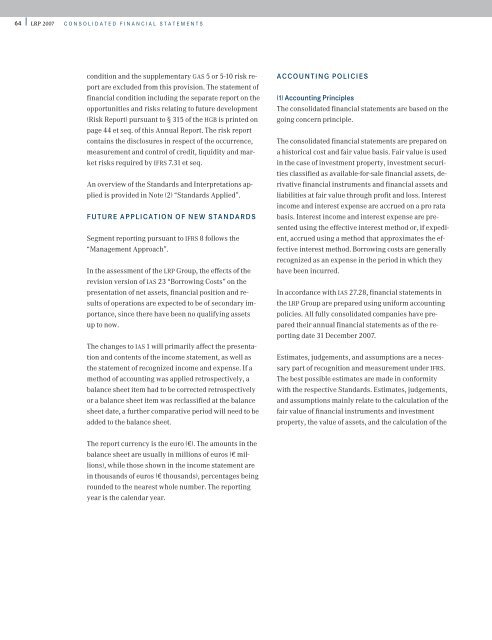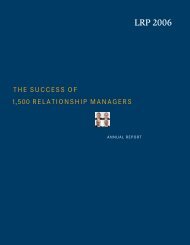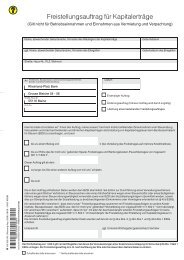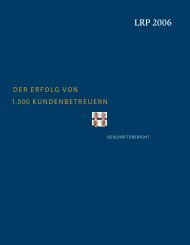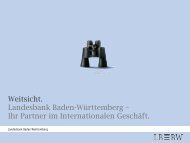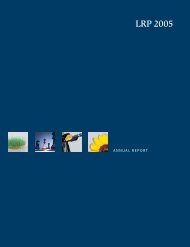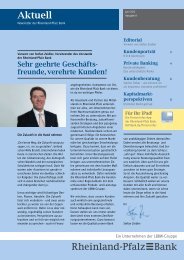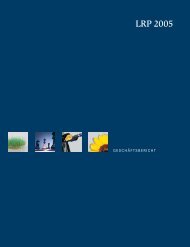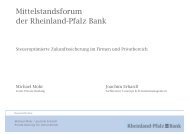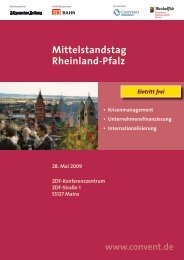Annual Report LRP 2007 - Rheinland Pfalz Bank
Annual Report LRP 2007 - Rheinland Pfalz Bank
Annual Report LRP 2007 - Rheinland Pfalz Bank
Create successful ePaper yourself
Turn your PDF publications into a flip-book with our unique Google optimized e-Paper software.
64 <strong>LRP</strong> <strong>2007</strong> CONSOLIDATED FINANCIAL STATEMENTS<br />
condition and the supplementary GAS 5 or 5-10 risk report<br />
are excluded from this provision. The statement of<br />
financial condition including the separate report on the<br />
opportunities and risks relating to future development<br />
(Risk <strong>Report</strong>) pursuant to § 315 of the HGB is printed on<br />
page 44 et seq. of this <strong>Annual</strong> <strong>Report</strong>. The risk report<br />
contains the disclosures in respect of the occurrence,<br />
measurement and control of credit, liquidity and market<br />
risks required by IFRS 7.31 et seq.<br />
An overview of the Standards and Interpretations applied<br />
is provided in Note (2) “Standards Applied”.<br />
FUTURE APPLICATION OF NEW STANDARDS<br />
Segment reporting pursuant to IFRS 8 follows the<br />
“Management Approach”.<br />
In the assessment of the <strong>LRP</strong> Group, the effects of the<br />
revision version of IAS 23 “Borrowing Costs” on the<br />
presentation of net assets, financial position and results<br />
of operations are expected to be of secondary importance,<br />
since there have been no qualifying assets<br />
up to now.<br />
The changes to IAS 1 will primarily affect the presentation<br />
and contents of the income statement, as well as<br />
the statement of recognized income and expense. If a<br />
method of accounting was applied retrospectively, a<br />
balance sheet item had to be corrected retrospectively<br />
or a balance sheet item was reclassified at the balance<br />
sheet date, a further comparative period will need to be<br />
added to the balance sheet.<br />
ACCOUNTING POLICIES<br />
(1) Accounting Principles<br />
The consolidated financial statements are based on the<br />
going concern principle.<br />
The consolidated financial statements are prepared on<br />
a historical cost and fair value basis. Fair value is used<br />
in the case of investment property, investment securities<br />
classified as available-for-sale financial assets, derivative<br />
financial instruments and financial assets and<br />
liabilities at fair value through profit and loss. Interest<br />
income and interest expense are accrued on a pro rata<br />
basis. Interest income and interest expense are presented<br />
using the effective interest method or, if expedient,<br />
accrued using a method that approximates the effective<br />
interest method. Borrowing costs are generally<br />
recognized as an expense in the period in which they<br />
have been incurred.<br />
In accordance with IAS 27.28, financial statements in<br />
the <strong>LRP</strong> Group are prepared using uniform accounting<br />
policies. All fully consolidated companies have prepared<br />
their annual financial statements as of the reporting<br />
date 31 December <strong>2007</strong>.<br />
Estimates, judgements, and assumptions are a necessary<br />
part of recognition and measurement under IFRS.<br />
The best possible estimates are made in conformity<br />
with the respective Standards. Estimates, judgements,<br />
and assumptions mainly relate to the calculation of the<br />
fair value of financial instruments and investment<br />
property, the value of assets, and the calculation of the<br />
The report currency is the euro (W). The amounts in the<br />
balance sheet are usually in millions of euros (W millions),<br />
while those shown in the income statement are<br />
in thousands of euros (W thousands), percentages being<br />
rounded to the nearest whole number. The reporting<br />
year is the calendar year.


